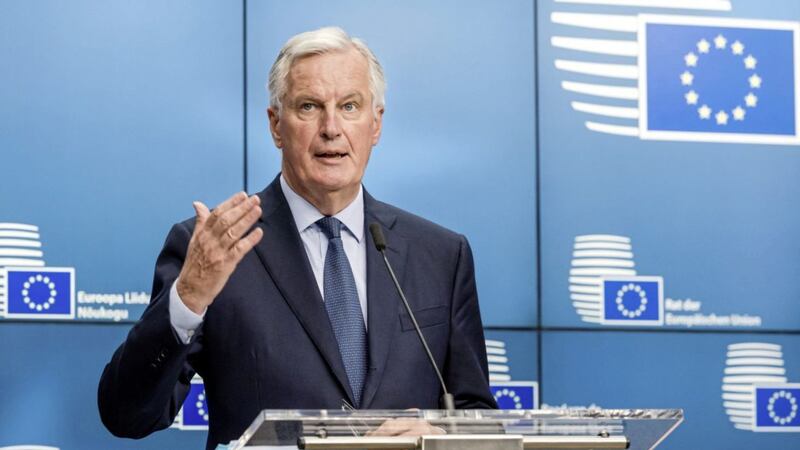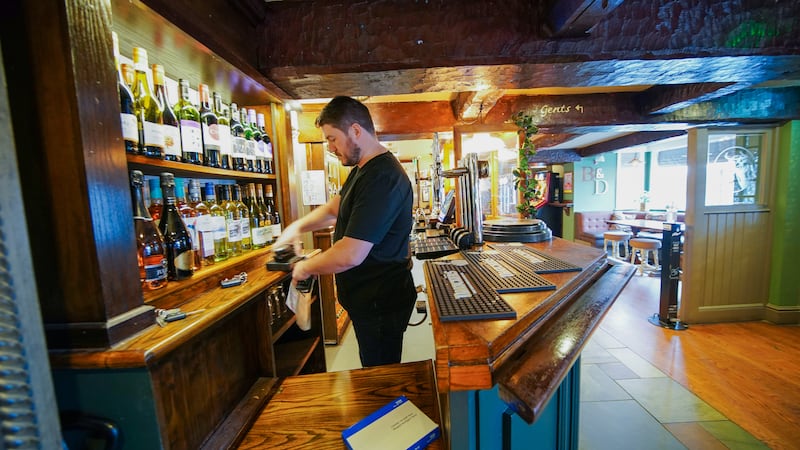Key elements of British Prime Minister Theresa May's Chequers plan for Brexit are "not acceptable" to Brussels, the EU's chief negotiator has told MPs.
But a transcript of Michel Barnier's evidence to the House of Commons Exiting the EU Committee showed that he did not describe the blueprint agreed at the PM's country residence in July and set out in the British government's Brexit White Paper as "dead", as Labour MP Stephen Kinnock claimed earlier this week.
In a hearing of the committee in Westminster on Wednesday, Mr Kinnock broke into French to tell Brexit Secretary Dominic Raab that the EU negotiator had told them "les propositions sont mortes" - "the proposals are dead".
"I can tell you absolutely, unequivocally, without a shadow of a doubt that Chequers is dead in the water," the Labour committee member told Mr Raab. "Michel Barnier made it crystal clear that Chequers is completely unacceptable to the EU."
But a transcript of Monday's meeting, held behind closed doors in Brussels, shows that, in response to repeated questioning over whether the proposals were dead, Mr Barnier insisted he was not rejecting them outright.
Asked by committee chairman Hilary Benn whether the Chequers plan was "dead in the water", Mr Barnier replied: "In the White Paper there are lots of positive things, lots of useful things, just to make that absolutely clear.
"I did not just reject the White Paper outright; that is just not true. I hope that you will understand that."
However, he made clear that Brussels will not accept Mrs May's proposals on customs arrangements, as well as her suggestion that the UK and EU could have a free trade area with a common rulebook for goods but not services.
In a translation of his comments released by the committee, Mr Barnier said: "The proposals made in the White Paper on two points are not acceptable as they are, they are not acceptable to the EU - that is the White Paper proposal on customs and the White Paper proposal on the common rulebook for goods."
On Mrs May's suggestion that the UK could carry out customs checks on its borders on the EU's behalf, he said: "Your proposal does not seem workable to us."
Mr Barnier said that agreement on the UK's withdrawal deal and a political declaration on the future relationship must be reached by the start of November in order to have time for ratification by the scheduled date of Brexit on March 29.
Asked whether the deal would be ready by the deadline of October 18's European Council summit, he told MPs: "We might need a few extra days. I have always said that give or take a day or a week, the essential thing to do is to get a good result, even if it takes a few days longer."
But he added pointedly: "It is not extra time we need now. It is decisions we need now."
Mr Barnier said that the future of the Irish border remained the "main obstacle" to a withdrawal agreement, telling MPs he was "very concerned about Ireland".
He dismissed as "too easy" the suggestion put forward by some Brexiteers that the Irish border could simply be kept open, arguing that this would not allow either the EU or the UK to protect their consumers and businesses.
But he said that the EU was "open" to discussing other backstop arrangements for Northern Ireland than the Brussels proposal for it to remain within the European customs area, which has been roundly rejected by Mrs May.
Mr Barnier insisted that the EU wants to establish "the closest relationship possible with your country ... an unprecedented relationship" following Brexit.
But he said that Mrs May's proposals for a "facilitated customs arrangement" - under which tariffs gathered at the border on goods heading for continental Europe would be passed on to Brussels - were "impossible, technically speaking, for us to implement".
The proposal would create "extra cost and bureaucracy", risk a "major distortion in competition" to the disadvantage of EU companies, and "call into question the very integrity of our single market", he said.
Mrs May's White Paper appeared to be suggesting "a kind of a la carte single market, a kind of cherry-picking approach, and we do not agree", he said. "We cannot agree to that."
Mr Barnier rejected a suggestion from prominent Brexiteer Jacob Rees-Mogg that the "divorce bill" of around £40 billion agreed by Mrs May represents a payment for a future trade deal and could be withheld if the EU failed to come up with terms acceptable to the UK.
There was "no question" of going back on the financial settlement, which related only to commitments made by the UK during its time as an EU member, he said, telling Mr Rees-Mogg: "That figure is settlement for the past. You want to leave the European Union. That is your decision, so we settle the accounts."
Mr Barnier indicated that he expects the economic consequences of Brexit to become clear in the UK within a few years.
"We will see in a few years' time where we are, where the advantages and disadvantages are," said Mr Barnier. "We will see by then whether it is better to have a common trade policy or to go it alone. We will see then.
"I hope you do well. I hope you are successful, quite frankly, but I think myself in negotiating with Mr Trump, in negotiating with the Chinese, it is better to be in a big group and to be sitting on a big single market and a common trade policy... In today's world I think it is better to be strong together when it comes to negotiating with the other major powers that are not going to wait for us."








